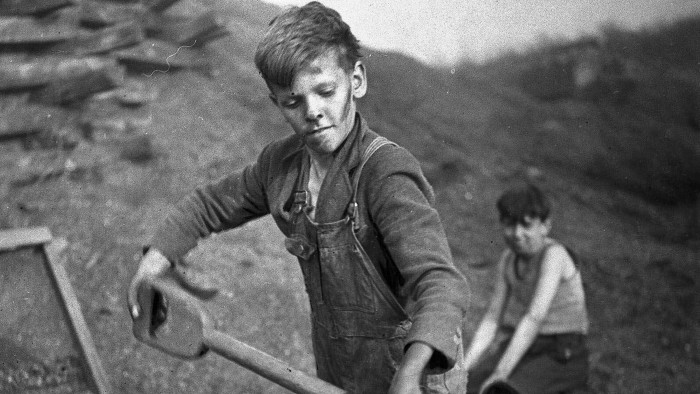Unlock the White House Watch newsletter for free
Your guide to what the 2024 US election means for Washington and the world
There is a retro vibe to America under Donald Trump’s second term as president. Mercantilism is back. Measles is back. Now child labour might be back too.
Take a legislative proposal in Florida to reduce restrictions on the “employment of minors”. This isn’t about making it easier for teenagers to have weekend or summer jobs. A state senate bill proposes to allow employers to schedule 16 and 17-year-olds to work after 11pm and before 6.30am when they have school the next day. The bill would also remove a 30-hour limit on how much 16 and 17-year-olds can work in a week when school is in session, and remove their right to a break after four hours. This would also apply to 14 and 15-year-olds who have already graduated high school, are home schooled, or enrolled in virtual school.
Why? Republican state senator Jay Collins, the bill’s sponsor, told a committee hearing it would simply align Florida with federal child labour law (which dates back to 1938) and would be good for young people. “This is about providing soft skills in executive function.” Finally, he argued, the bill was about restoring the rights of parents: “Parents are best suited to take care of their kids and manage their schedules.”
But it’s hard to imagine why any parent would want their teenage child to work a night shift before school, or why they would appreciate the opportunity for their child not to have breaks. The danger, opponents of the bill have argued, is that teenagers from poor families with absent or struggling parents would feel pressured by employers into agreeing to these shifts because they needed the job. That would come at the cost of their education — their best chance of getting out of poverty. According to the Florida Policy Institute, a think-tank that opposes the bill, almost 20 per cent of students are already “chronically absent” from Florida schools (defined as absent for 21 days or more).
One young woman from an immigrant family travelled to the hearing to explain to lawmakers that she had worked since she was 15. “Every single job, they took advantage of me . . . And I did not tell my parents because I wanted to provide for them,” she said, before pleading with the lawmakers to vote “no” to the bill. They voted “yes”. (There are, however, several more stages for it to go through.)
Then there are the health implications. Scientists know much more than they used to about how much damage it does to the human body to work at night, such as an increased risk of developing diabetes or cancer. “Night shift work is ghastly for a whole number of reasons,” Russell Foster, professor of circadian neuroscience at the University of Oxford, told me. Teenagers, in particular, require a lot of sleep for their brains to function well. “It’s going to be poor kids that are going to be doing this, so it will marginalise their educational opportunities even further, so they won’t have that ladder to get out of the poverty trap.”
Florida isn’t an aberration. The Economic Policy Institute think-tank says 31 US states introduced bills to weaken child labour protections between 2021 and 2024. “It’s much bigger than Florida,” Nina Mast, a policy analyst at the EPI, told me. She thought the bills were a “co-ordinated effort” led by business industry groups with the aim of offsetting pressure to raise wages in the context of tight labour markets and the possible mass deportation of immigrants. But while the trend isn’t limited to Florida, a number of US states including Colorado and Illinois are moving in the opposite direction to strengthen child labour protections and increase penalties for employers that breach them.
It’s hard not to see this as a tussle between the future and the past. After the industrial revolution began in Britain, lawmakers spent years debating whether and how to intervene over widespread child labour. Some argued that “any interference with the rights of parents and masters” was “against principle”, as one put it. But intervention won the day: night work in textile factories for under-18s was banned in the first half of the 19th century (albeit with poor enforcement to begin with) and more regulations followed. Proponents of these bills argued the health and education of the “rising generation” mattered because, as one put it, “the promise of the future” lay with them.
It feels odd to refer to an almost 200-year-old debate in a column about policy in 2025. But, as the 21st-century phrase goes, “you’ve got to meet people where they’re at”. And where parts of America are now at, it seems, is the 1800s.
